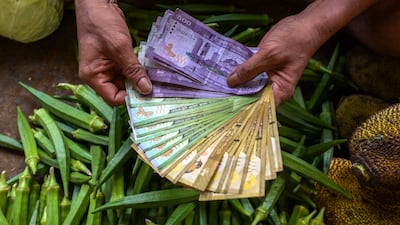The International Monetary Fund has approved a $3 billion bailout loan to help Sri Lanka in restructuring its debt and addressing its crisis-hit economy.
“Today’s board approval marks an important step towards the resolution of the crisis,” Peter Breuer, the fund's senior mission chief for Sri Lanka, and Masahiro Nozaki, the mission chief for Sri Lanka, Asia and the Pacific, said on Monday.
The loan aims to help the country to restore the stability of the economy and manage its debt as it presses forward with structural reforms.
The fund and Sri Lanka had reached a preliminary agreement on the loan in September, which was subject to the approval of the fund's management and executive board.
IMF board approval required assurances from official bilateral creditors that they would provide debt relief and/or financing to restore debt sustainability, as well as an assessment that Sri Lankan authorities were making progress in efforts to reach a collaborative agreement with private creditors.
These requirements were met before the board meeting was held, the fund said.
The public debt of Sri Lanka, which was “hit hard by a catastrophic economic and humanitarian crisis”, reached at 128 per cent of gross domestic product at the end of 2022.
In 2021, its foreign debt was equal to 64.2 per cent of its gross domestic product while its total debt was equal to 119 per cent of the country's GDP.
Sri Lanka's economy contracted by 8.7 per cent in 2022 and is forecast to shrink by 3 per cent this year.
Inflation hit an average of 46.4 per cent in 2022, affecting mostly the poor and vulnerable, but is expected to come down to 28.5 per cent this year, the fund said.
The debt is “unsustainable” and the country is in arrears to all its external creditors, the fund's staff said.
“Commendably, Sri Lanka has already started implementing these challenging policy actions. It is now essential to continue the reform momentum under strong ownership by the authorities and the Sri Lankan people more broadly,” Mr Breuer and Mr Nozaki said.
“The economic impact of the reforms on the poor and vulnerable needs to be mitigated with appropriate measures.”
Faced with its worst economic crisis since independence in 1948, as well as dwindling foreign currency reserves and a shortage of fuel and medicine, the island nation of 22 million people said last April that it would defaulting on $51 billion of external debt for the first time.
It subsequently missed interest payments on some of its sovereign bonds.
“Sri Lanka has been facing tremendous economic and social challenges, with a severe recession amid high inflation, depleted reserves, an unsustainable public debt and heightened financial sector vulnerabilities,” IMF Managing Director Kristalina Georgieva separately.
Ms Georgieva said institutions and governance frameworks required deep reforms.
“Ambitious revenue-based fiscal consolidation is necessary for restoring fiscal and debt sustainability while protecting the poor and vulnerable … the momentum of ongoing progressive tax reforms should be maintained, and social safety nets should be strengthened and better targeted to the poor,” she said.
“For the fiscal adjustments to be successful, sustained fiscal institutional reforms on tax administration, public financial and expenditure management, and energy pricing are critical.”
Under the IMF programme, the reforms include the broadening of the base for corporate income tax and VAT, which will help the country to reach a primary surplus of 2.3 per cent of GDP by 2024, according to the fund's estimates.
Another element of the fund's programme is the introduction of cost-recovery-based pricing for fuel and electricity to minimise fiscal risks arising from state-owned enterprises.
Sri Lanka's central bank will also need to rebuild its foreign reserves and restore a market-determined and flexible exchange rate, in line with the fund's programme.
Last month, the island country of 22 million marked 75 years since independence as President Ranil Wickremesinghe, who took office last July at the height of political unrest, called for reflection on “errors and failures” during a time of national crisis.
A rallying cry among protesters last year was that Sri Lanka’s extremely low tax rates and tax exemptions, which primarily benefitted the wealthiest in the country, had contributed to the economic crisis.
Ms Georgieva called on Sri Lanka to stay committed to the multipronged disinflation strategy to protect the credibility of its measures to bring down inflation to its set target.
“As the market regains confidence, the authorities’ recent introduction of greater exchange rate flexibility will help to rebuild the reserve buffer,” she said.
As Sri Lankan authorities and creditors closely co-ordinate and make progress towards the restoration of debt sustainability, measures to fight corruption are also essential, Mr Breuer and Mr Nozaki said.
“We emphasise the importance of anti-corruption and governance reforms … they are indispensable to ensure the hard-won gains from the reforms benefit the Sri Lankan people.”

